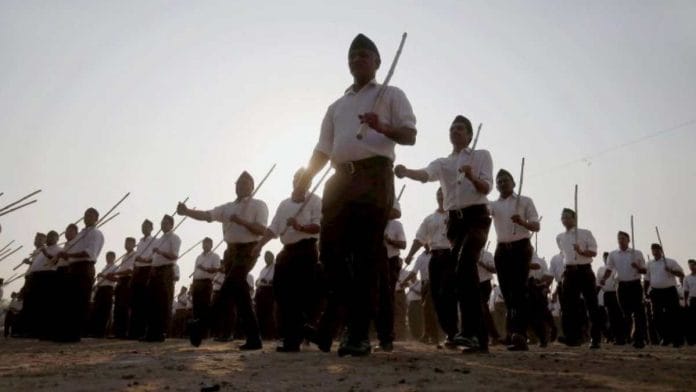New Delhi: All eyes are set on the Rashtriya Swayamsevak Sangh’s (RSS) top decision-making body Akhil Bharatiya Pratinidhi Sabha (ABPS), which held its two-day meeting beginning Friday, as there is a strong likelihood of Suresh Bhaiyyaji Joshi stepping down as the RSS sarkaryavah (general secretary).
An election regarding this will be taken in the ABPS, which meets annually. The meeting generally lasts for three to four days, and is attended by the RSS top brass.
Last year, the ABPS’ scheduled meet in Bengaluru was cancelled due to Covid-19. The ABPS has representatives from various frontal organisations of the RSS.
ThePrint looks at the top RSS brass who run the organisation.
Sarsanghchalak — Mohan Bhagwat
The sarsanghchalak is the ‘Guide and Philosopher of the Rashtriya Swayamsevak Sangh’. His position is decided primarily through a nomination done by the predecessor.
According to the official literature of the RSS, a sarsanghchalak ‘may attend, summon or address any assembly of the swayamsevaks, Akhil Bharatiya Pratinidhi Sabha and karyakari mandals severally or jointly’. He continuously travels across the states to take stock of the organisational work often referred to as ‘pravas’.
Sarkaryavah — Suresh Bhaiyyaji Joshi
Suresh Bhaiyyaji Joshi is an elected member of the Akhil Bharatiya Pratinidhi Sabha. This is the most crucial position as he is responsible for day to day functioning of the organisation and in the modern terminology, he can be referred to as the RSS CEO.
He is responsible for carrying out several activities related to the organisation and decides on the meetings to be held and where the ‘pravas’ will be conducted.
Election to this position will be held Saturday during the ABPS meeting.
RSS’ another decision-making body, the Akhil Bharatiya Karyakarini, comprises the RSS chief, general secretary, joint general secretaries, heads and deputy heads of its various wings — physical (sharirik), intellectual (bauddhik), media (prachaar), public relations (sampark), social services (sewa) and logistics (vyavastha).
To assist the general secretary, the RSS currently has six sah-sarkayavah or joint general secretaries — each tasked with a different vertical.
Also read: Role played by the crucial Akhil Bharatiya Pratinidhi Sabha of RSS, which meets this week
The six joint general secretaries
Suresh Soni, one of the joint general secretaries, is responsible for carrying out the organisational work of the sangh. For instance, there are a number of RSS offices and it requires supervision.
He also oversees the entire system of pracharaks. “Say if one has to set up a think tank, then Soni ji will supervise it and ensure all formalities are done and it is set up properly. So logistics is his responsibility,” said a senior RSS functionary.
Dattatreya Hosable, another joint general secretary, is responsible for ‘sewa, sampark and prachar’. He has public relations under him and manages communication and outreach.
For instance, he ensures that the sampark vibhag connects people from all walks of life such as bureaucrats, chartered accountants, professionals, traders, essentially people, who have a certain stature in society and have not been connected with the RSS.
“Not only this, the sampark vibhag also carries out outreach with diplomats,” added the functionary.
He also coordinates with Sewa Bharti whose main task is to work for the poor and marginalised sections of the society in urban and rural areas.
“He will oversee their work, though they work independently. For instance, during the lockdown last year due to Covid, they provided ration and sanitisers to people, including those living in the red light area in the capital. His job is to look at the welfare measures being undertaken by them,” said a second RSS functionary.
Dr Krishna Gopal, a third joint general secretary, keeps contact with organisations such as Vishwa Hindu Parishad and Swadeshi Jagran Manch, among others.
“These are independent organisations, but it is ensured that they work within the broad ideological framework of the sangh parivar framework,” he added.
V. Bhaigaih is responsible for looking after the ‘Samajik Samrasta’ (social harmony) and social services wing. This includes organising seminars, programmes regarding educating, and creating awareness about social discrimination.
At the same time, other social activities related to the environment, development of villages, and cow protection are also under him.
Manmohan Vaidya looks after the ‘prachar vibhag’ or the media relations. This includes communication with traditional media as well as social media.
At the same time, the idea is to carry out outreach programmes, press conferences and disseminate information related to the RSS.
Mukund, the sixth joint general secretary, has the physical and intellectual activities’ wings under him.
“Under the sharirik vibhag one has to take decisions regarding organising training camps, shakhas, new exercises etc. Apart from physical training, the other aspect is the intellectual training of the attendee,” said the second functionary.
At the same time, issues related to narratives, social discourse also come under his jurisdiction for which seminars, conferences and programmes are conceived and organised.
“The intellectual wing also works along with sampark vibhag and generates relevant content related to the sangh and disseminates it,” said the functionary.
(Edited by Debalina Dey)
Also read: Pracharaks and informal groups — How BJP and its ideological mentor, RSS, coordinate






